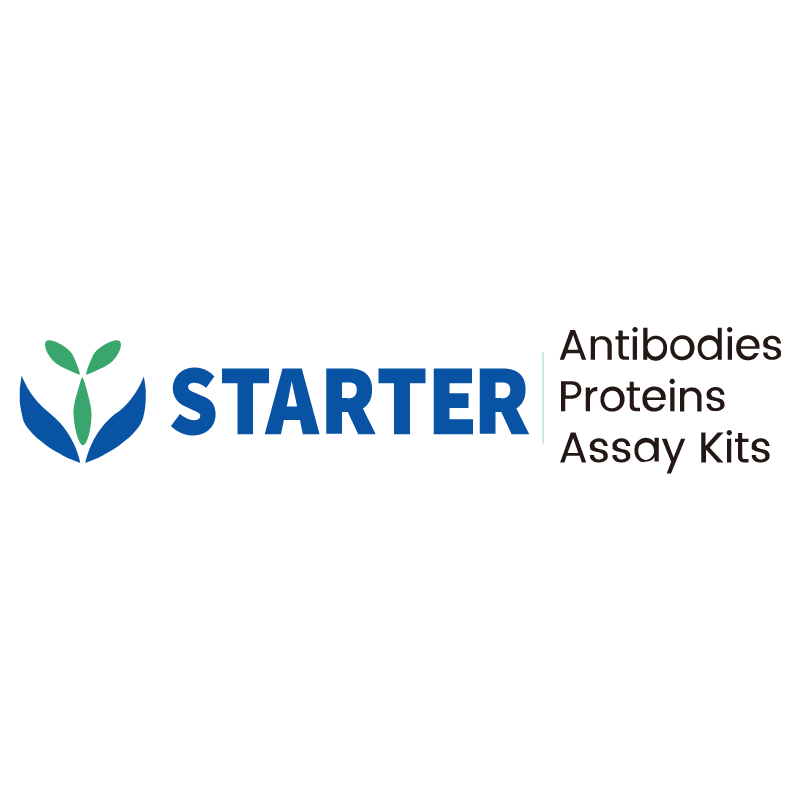Flow cytometric analysis of 4% PFA fixed 90% methanol permeabilized human PBMC (human peripheral blood mononuclear cell) labelling CCR7 antibody at 1/50 (1 μg) dilution (Right) compared with a Rabbit monoclonal IgG isotype control (Left). Goat Anti - Rabbit IgG Alexa Fluor® 488 was used as the secondary antibody.
Live cells were stained with CD4 - Alexa Fluor® 647 separately. Fixed with 4% PFA and permeabilized with 90% methanol followed by intracellularly staining with Rabbit monoclonal IgG isotype control or CCR7 antibody. Gated on viable lymphocytes.
Product Details
Product Details
Product Specification
| Host | Rabbit |
| Antigen | CCR7 |
| Synonyms | C-C chemokine receptor type 7, C-C CKR-7, CC-CKR-7, CCR-7, BLR2, CDw197, Epstein-Barr virus-induced G-protein coupled receptor 1 (EBI1; EBV-induced G-protein coupled receptor 1), MIP-3 beta receptor, CD197, CMKBR7, EBI1, EVI1 |
| Immunogen | Synthetic Peptide |
| Location | Cell membrane |
| Accession | P32248 |
| Clone Number | S-999-29 |
| Antibody Type | Recombinant mAb |
| Isotype | IgG |
| Application | IHC-P, ICFCM |
| Reactivity | Hu, Ms, Rt |
| Predicted Reactivity | Bv |
| Purification | Protein A |
| Concentration | 0.5 mg/ml |
| Conjugation | Unconjugated |
| Physical Appearance | Liquid |
| Storage Buffer | PBS, 40% Glycerol, 0.05% BSA, 0.03% Proclin 300 |
| Stability & Storage | 12 months from date of receipt / reconstitution, -20 °C as supplied |
Dilution
| application | dilution | species |
| IHC-P | 1:100 | |
| ICFCM | 1:50 |
Background
CCR7 protein, also known as CC-chemokine receptor 7, is a G protein-coupled receptor encoded by the CCR7 gene. CCR7 is mainly distributed on the surfaces of lymphocytes, dendritic cells, monocytes, and certain epithelial cells, and its expression pattern in tissues is very strict and specific. CCR7 plays an important role in regulating the migration and localization of lymphocytes and dendritic cells in the body, promoting the activation and proliferation of lymphocytes, and regulating the differentiation and function of immune cells. CCR7 signaling pathways can regulate inflammatory responses and immune responses by activating various signaling molecules such as PI3K, MAPK, and NF-κB. Furthermore, CCR7 is closely related to autoimmune diseases such as multiple sclerosis (MS), rheumatoid arthritis (RA), and psoriasis. For example, in MS, increased levels of CCL19 in the cerebrospinal fluid are associated with increased T cell infiltration and increased proinflammatory CCR7-positive dendritic cells in the cerebrospinal fluid of MS patients. Blocking CCR7 signaling seems to reduce the pathogenic processes mediated by cerebrospinal fluid and immune cells in MS. Similarly, CCR7 is also involved in the pathogenesis of RA and psoriasis.
Picture
Picture
FC
Immunohistochemistry
IHC shows positive staining in paraffin-embedded human spleen. Anti-CCR7 antibody was used at 1/100 dilution, followed by a HRP Polymer for Mouse & Rabbit IgG (ready to use). Counterstained with hematoxylin. Heat mediated antigen retrieval with Tris/EDTA buffer pH9.0 was performed before commencing with IHC staining protocol.
IHC shows positive staining in paraffin-embedded human tonsil. Anti-CCR7 antibody was used at 1/100 dilution, followed by a HRP Polymer for Mouse & Rabbit IgG (ready to use). Counterstained with hematoxylin. Heat mediated antigen retrieval with Tris/EDTA buffer pH9.0 was performed before commencing with IHC staining protocol.
IHC shows positive staining in paraffin-embedded human colon. Anti-CCR7 antibody was used at 1/100 dilution, followed by a HRP Polymer for Mouse & Rabbit IgG (ready to use). Counterstained with hematoxylin. Heat mediated antigen retrieval with Tris/EDTA buffer pH9.0 was performed before commencing with IHC staining protocol.
Negative control: IHC shows negative staining in paraffin-embedded human pancreas. Anti- CCR7 antibody was used at 1/100 dilution, followed by a HRP Polymer for Mouse & Rabbit IgG (ready to use). Counterstained with hematoxylin. Heat mediated antigen retrieval with Tris/EDTA buffer pH9.0 was performed before commencing with IHC staining protocol.
IHC shows positive staining in paraffin-embedded human thyroid cancer. Anti-CCR7 antibody was used at 1/100 dilution, followed by a HRP Polymer for Mouse & Rabbit IgG (ready to use). Counterstained with hematoxylin. Heat mediated antigen retrieval with Tris/EDTA buffer pH9.0 was performed before commencing with IHC staining protocol.
IHC shows positive staining in paraffin-embedded mouse spleen. Anti-CCR7 antibody was used at 1/100 dilution, followed by a HRP Polymer for Mouse & Rabbit IgG (ready to use). Counterstained with hematoxylin. Heat mediated antigen retrieval with Tris/EDTA buffer pH9.0 was performed before commencing with IHC staining protocol.
IHC shows positive staining in paraffin-embedded rat spleen. Anti-CCR7 antibody was used at 1/100 dilution, followed by a HRP Polymer for Mouse & Rabbit IgG (ready to use). Counterstained with hematoxylin. Heat mediated antigen retrieval with Tris/EDTA buffer pH9.0 was performed before commencing with IHC staining protocol.


